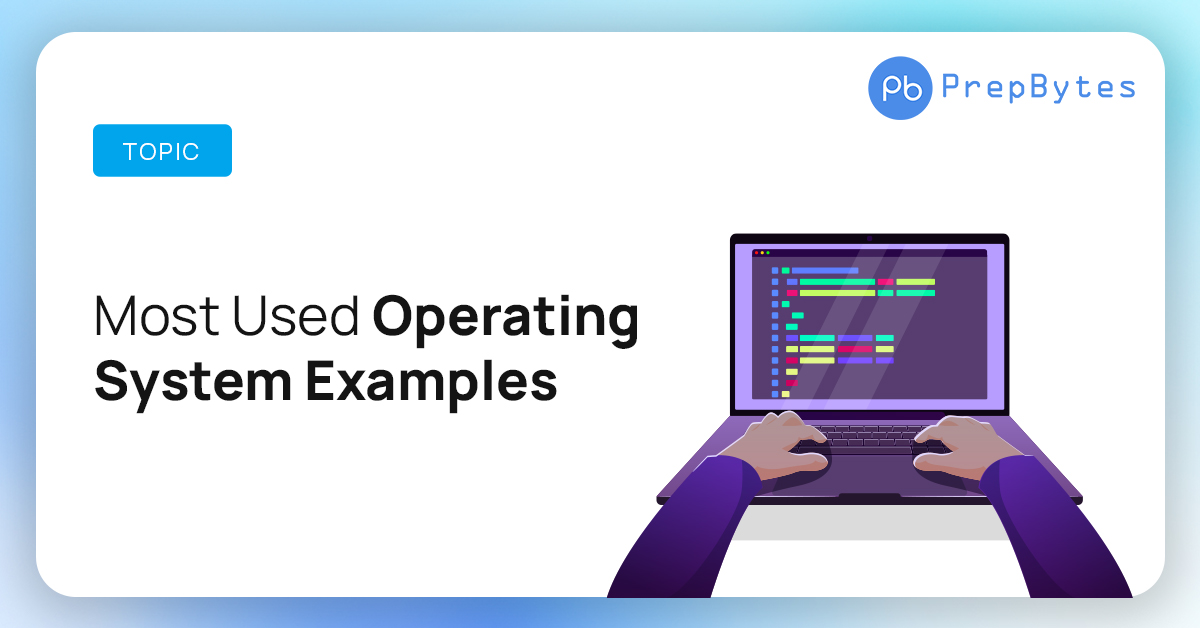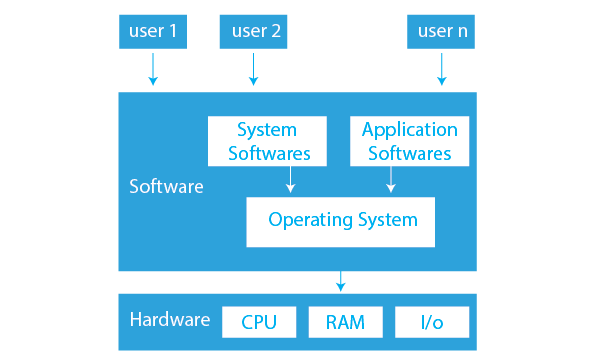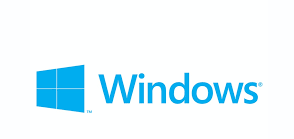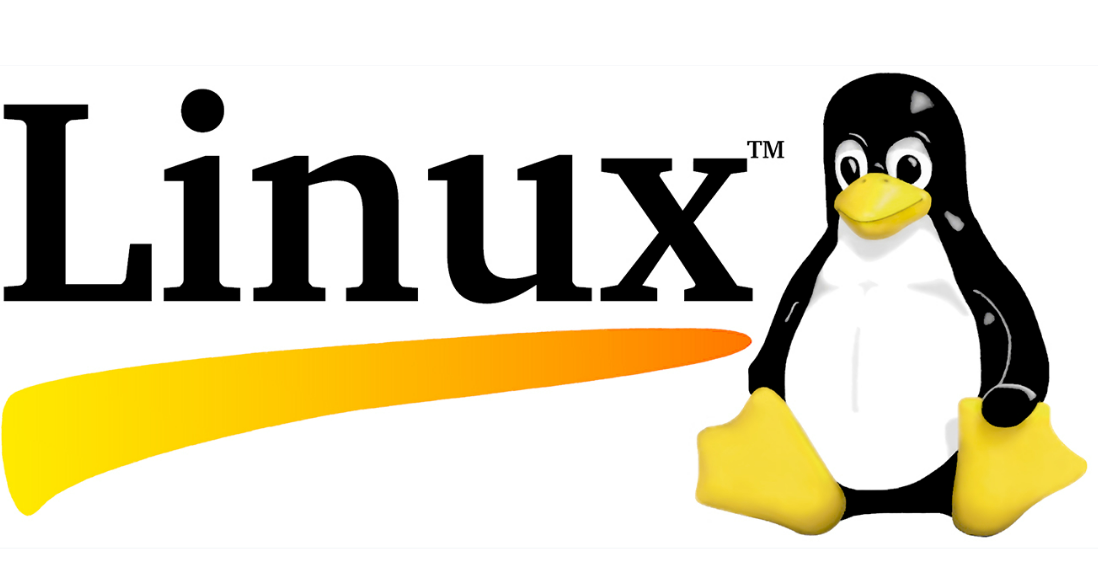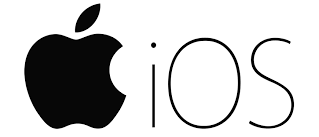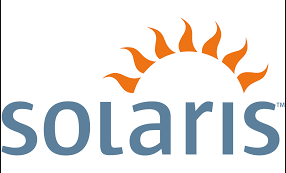In this article, we are going to see the most used operating system examples. We will discuss the following most used operating system examples; Windows, Linux, Android, Apple iOS, Apple macOS, and Solaris. So, first, let’s start by recalling the meaning of an operating system. Operating systems are one of the most important parts of the system and there are a variety of commonly used operating systems depending on the usage. Before moving to “most used operating system in the world”, Let’s discuss what an operating system is.
What is an Operating System?
An operating system acts as an interface between the hardware and the user, or those of us who use computers. Through the use of some application programs, it enables user interaction with the hardware (applications like word, power-point presentation, etc.)
An operating system’s main objective is to make life easier for people. The following diagram illustrates how an operating system functions as an interface between a user and hardware.
Popular Operating System
So, now that we have understood the meaning of an operating system, let us now study some most commonly used operating system examples.
Microsoft Windows:
Microsoft Windows is one of the oldest and most widely used operating systems. The main goal of the Windows Operating System is to provide user convenience because of its pretty simple and interactive Graphical User Interface (GUI). The main idea of Windows is that every common person who uses a computer is not a programmer. So, they can’t type in commands on a terminal for performing small operations like opening a file or listing all directories, etc. So, the focus is on GUI and keeping it as simple as possible.
However, it is also possible to interact by typing commands in windows too. This is implemented in windows CMD or Windows Powershell.
Advantages:
- Almost all the hardware devices are compatible with windows OS. So, you can connect different devices of your choice at your convenience.
- The windows license comes up with a lot of pre-installed applications that are very useful for the users.
- The simple Graphical User Interface (GUI) of windows makes it easy to use for all kinds of users from kids to grandparents, a simple newbie to computers to a highly skilled programmer, etc.
Disadvantages:
The security threats in the Windows Operating System is an issue. Windows allows the installation of many unofficial or unrecognized programs that might contain viruses or corrupted files. So, this is one aspect of windows that can be improved.
Linux:
Linux is one of the most popular operating system examples. Linux is used today by companies, in supercomputers, and even by common users. It was developed by Linus Torvalds in 1991 and hence it is named Linux.
The Linux Operating System was built taking inspiration from UNIX operating system. This is why it has almost all the features that UNIX Operating System had. There are multiple versions in which we find the Linux distributions such as Ubuntu (probably the most popular one), Bebin, Solas, etc.
Linux provides a lot more power to the developers specifically because of a very powerful command line terminal. Almost every small to large thing in Linux can be done by typing commands in Linux and this is why it is the favorite OS of programmers.
Advantages:
- Linux is open-source software and is available free of cost.
- It provides very high security, especially when compared to the Windows Operating System.
- It is suitable for programmers and developers as it provides them with a lot of flexibility.
Disadvantages:
- Not the best Operating System for gaming as it lacks very frequently.
- There are so many versions of Linux with almost every version having the same functionalities. So, a normal user gets confused about which version he/she should go with.
Android:
Android is the Operating System for smartphones and tablet devices. This is the OS that is in everybody’s pocket nowadays. The android operating system is very flexible and easy to use. We can play games on it, listen to music, and even work on files and data. Android is the most popular OS in today’s world. For downloading apps and services, every android OS has an inbuilt playstore application. This playstore application helps the user download apps into their phones/tablets over the internet.
Advantages:
- Since this Operating System is available on phones and tablets, it is the most portable OS because we carry the phones in our pockets.
- The operating system can perform a lot of tasks and so many applications can’t be run on any other Operating system apart from android.
Disadvantages:
Like the windows operating system, security is one of the major concerns in Android OS. This is because many unrecognized apps can be downloaded from some websites in APK formats that might contain viruses.
Apple iOS:
Like the android Operating System, Apple iOS is also an Operating System for portable devices, however, it is the operating system for Apple smartphones or iPhones. Just like android phones contain playstore for downloading applications, iOS provides an app store for downloading the necessary applications.
Advantages:
- It is only available for iPhones and thus has some special features available exclusively to iPhone users.
- It has high security as compared to android phones. You can’t just download any application in the format of an APK from the website. Only the apps allowed and recognized by Apple are allowed to be downloaded on iOS.
Disadvantages:
The disadvantage of iOS is its limited availability to users because it is only available on iPhones.
Apple macOS:
Apple has a different operating system for its laptops and Desktop devices called macOS. Just like the difference between iOS and Android, macOS is more secure than Windows, however, has limited usage because its only available for MacBooks (Apple’s laptops) and Apple desktop systems.
Advantages:
- Very innovative and smooth GUI.
- Highly secure and powerful OS.
Disadvantages:
Limited usage because of its availability only on Apple devices.
Solaris
It is a type of UNIX operating system developed by Sun Microsystems. The most important functionality of the Solaris OS is its scalability. OpenSolaris is the open-source version of Solaris.
Advantages:
- It has very high performance.
- Very high security from viruses and malware.
Disadvantages:
- It is not a user-friendly OS.
- The updates are regular to pop-up, however, they are not free of cost.
So, these were some of the most used operating system examples. We hope that you liked the discussion and got to learn about these operating systems. We hope to see you again soon at PrepBytes.
Conclusion
In the grand tapestry of technological evolution, operating systems stand as the linchpins that enable our devices to fulfill their potential. From the towering giants like Windows and Android, to the minimalist elegance of macOS and the precision of Linux, these systems have indelibly marked our lives. As we navigate the landscape of operating systems, we are reminded that our digital world is a mosaic of choices, each one tailored to meet our diverse needs. The journey continues, with operating systems evolving to shape our tomorrows, just as they have sculpted our yesterdays.
FAQ Related to commonly used Operating System
Here are some FAQs related to most used operating system in the world.
1. Which operating system is the most widely used?
As of now, Microsoft Windows and Android are two of the most widely used operating systems globally. Windows dominates the desktop market, while Android leads the mobile market due to its presence on a wide range of smartphones and tablets.
2. Can you give examples of common operating systems?
Certainly! Commonly used operating systems include Microsoft Windows (versions like Windows 10), macOS (used on Apple computers), and Linux (a versatile and open-source OS available in various distributions).
3. What is the significance of operating systems?
Operating systems are crucial as they provide an interface for users to interact with their devices. They manage hardware resources, run applications, and ensure smooth communication between software and hardware components.
4. How do operating systems evolve?
Operating systems evolve through updates and new versions that bring enhancements, security patches, and improved functionalities. They adapt to changing hardware landscapes, user preferences, and emerging technologies.



